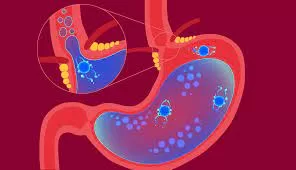
A study featured in the ERJ Open Research journal proposed that managing obstructive sleep apnoea (OSA) may have the added benefit of reducing nocturnal heartburn, coughing, and wheezing. Individuals with OSA often experience loud snoring, intermittent awakenings throughout the night, and periods of interrupted breathing. These symptoms not only lead to fatigue but also increase the risk of conditions such as high blood pressure, stroke, heart disease, and type 2 diabetes.
Continuous positive airway pressure (CPAP) machines function by delivering a constant stream of air through a face mask throughout the night, preventing the user’s airway from closing. While CPAP is primarily offered to individuals with obstructive sleep apnoea (OSA) to enhance their sleep quality, recent research suggests that this treatment may offer additional advantages.
The study was spearheaded by Professor Thorarinn Gislason, hailing from the Department of Sleep at Landspitali – The National University Hospital of Iceland in Reykjavík. He commented, “When we experience heartburn or acid reflux, we are sensing stomach acid moving upward toward the throat. People with obstructive sleep apnoea are three times more likely to experience frequent nighttime heartburn. Additionally, respiratory symptoms such as coughing and wheezing are also more prevalent in this group.”
Professor Gislason and his research team harnessed data from the Icelandic Sleep Apnea Cohort study, involving 822 patients diagnosed with moderate to severe obstructive sleep apnoea (OSA). Before initiating continuous positive airway pressure (CPAP) treatment, these patients underwent an overnight sleep study and provided comprehensive sleep-related information, including whether they experienced nighttime heartburn or belching.
Two years following the commencement of CPAP therapy, participants returned for a follow-up assessment, including an evaluation of their CPAP machine usage based on data recorded by the devices. The study revealed a noteworthy finding: individuals who consistently used CPAP machines were approximately 42% less likely to experience nighttime heartburn compared to those who used the machines sporadically or not at all. This reduction in reflux symptoms among CPAP users was associated with over a four-fold decrease in the likelihood of experiencing a productive morning cough and nearly a four-fold decrease in the risk of chronic bronchitis.
In addition to the benefits previously mentioned, consistent CPAP users were also found to be less prone to wheezing. However, the data indicates that this improvement is likely a direct consequence of the CPAP treatment itself, rather than solely being attributed to the reduction in nighttime reflux.

Researchers suggest that CPAP treatment, by maintaining an open upper airway during sleep, likely assists in keeping the valve between the stomach and the esophagus tightly closed. This mechanism may help prevent stomach acid from escaping into the esophagus, thus mitigating symptoms of acid reflux and associated issues such as wheezing.
Professor Gislason said, “Obstructive sleep apnoea is a common condition and, although we have good ways to diagnose and treat it, many people do not realise they have this problem. “I’m 71 years old and I have been a specialist lung doctor all my working life. I have seen many patients with recurrent respiratory symptoms who have been diagnosed with OSA and recovered when they got CPAP treatment. “Snoring, frequent waking and day-time tiredness are established signs of OSA. This study suggests that coughing and wheezing that do not get better with the usual treatments and night-time reflux should also be considered as possible signs of OSA that may require CPAP treatment.” Professor Winfried Randerath, Head of the European Respiratory Society’s Assembly on sleep disordered breathing, who was not involved in the research said: “OSA may manifest as loud snoring at night and daytime sleepiness, but research is showing that its effects can be widespread and serious. This study adds to our understanding of the risks of OSA, but it also shows how using CPAP treatment can help to reduce those risks.
Individuals who suspect they may have obstructive sleep apnoea (OSA) should seek consultation with their healthcare provider. For those who have received a diagnosis and have been prescribed CPAP treatment, it is highly advisable to adhere to regular usage. As research continues to uncover the expanding array of health benefits associated with CPAP therapy, consistent and diligent use of the CPAP machine becomes increasingly important.











